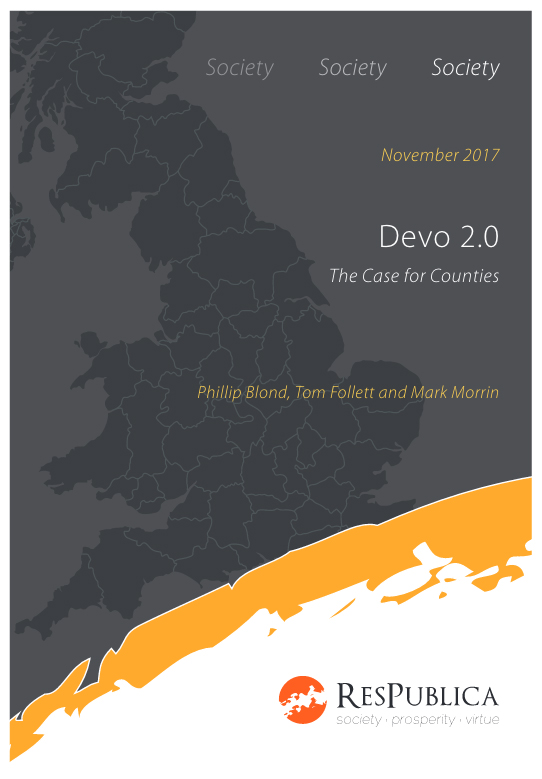
Abolishing 201 local councils in England and giving the rest London-style powers could benefit the economy by £31bn over five years, a report by think tank ResPublica has found.
ResPublica said the reform could result in huge improvements for housebuilding and public services in the counties of England. Cities have largely abandoned the two-tier system of local government in favour of ‘unitary’ local councils responsible for all plans and public services. The counties should now adopt single councils too, says ResPublica in its new report Devo 2.0: The Case for Counties.
Adopting the proposed reforms, followed by handing the English counties devolved powers similar to London and Manchester, could enable additional growth of £31bn over five years. This is a result of savings from single local councils of £2.9bn, and efficiencies of £11.7bn gained from devolving powers being reinvested in local growth.1
Phillip Blond, Director of ResPublica, said: “The needless confusion that frustrates the ambitions of business and government alike in our county areas must end now. With Brexit on the horizon and our city-regions already benefitting from devolution, we can’t afford the waste and complication that the current system creates. Single councils at the county scale are the future and we call on the Government to move rapidly to encourage them”
Some areas are already attempting to move to single councils, with Dorset and Buckinghamshire having submitted plans to the Government. Current arrangements cause confusion for developers, who can find their operations frustrated by parochial decision-making on important strategic issues. Reform would allow investors to have one point of contact, a consistent framework for regulations, and clear input into strategic planning.
Delivering new housing is a particular weakness in the current system. Figures show only 30% of two-tier areas are delivering enough houses to meet their growing populations, as opposed to 60% of unitary counties.2 Houses may be permitted by District councils in areas with no available schools, meaning County councils must provide free transport from home to schools in other areas, at an average cost of £1,500 per child.
The report says that with uncertain economic conditions after Brexit, it is vital that counties are in the strongest position possible to weather the storm. This is particularly the case in the counties which voted most strongly for Brexit. Recent data shows these counties tend to be more economically reliant on the EU than the cities, and therefore would be hardest hit by any trade reductions with the bloc.3
Baroness Jane Scott OBE, County Councils Network Reform Spokesperson and Leader of Wiltshire Council, said: “All elected councillors and local MPs would agree that the move to unitary for Wiltshire has been a huge success.
“ResPublica’s report highlights that streamlining counties will contribute billions to the national economy and will be good for business; but the real winners are local residents who will benefit from improved public services, less bureaucracy, and access to more housing and facilities that meet local need and demand.”
- Refers to gain in GVA (Gross Value Added). A multiplier for each year’s investment of 1:4.5 is assumed, based on spending by the pre-2010 Regional Development Agencies.
- For at least 95% of new population growth (New Household Formation)
- The UK Regional National Economic Problem: Geography, Globalisation and Governance. Philip McCann. Routledge.








